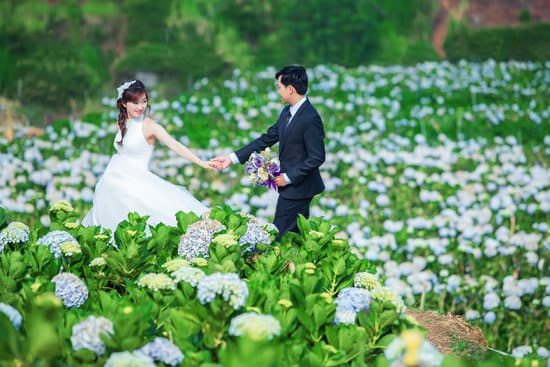Have you ever wondered, “Can two people officiate a wedding?” In the past, a single officiant has been the norm for wedding ceremonies, but times are changing.
The concept of having two people officiate a wedding is gaining popularity, offering couples a unique and meaningful way to tie the knot. This article will explore the rise of dual officiants, the legalities and requirements involved, the benefits of this approach, how to choose the right individuals, potential challenges and solutions, real-life examples, and conclude with a summary of this trend’s growing acceptance.
Traditionally, a single officiant has been responsible for leading wedding ceremonies. However, as more couples seek to personalize their nuptials and include important individuals in the ceremony itself, there has been a notable shift towards having two people officiate a wedding. This evolution reflects a desire for inclusivity and customization in modern weddings.
The rise of dual officiants highlights not only a shift in ceremonial practices but also serves as an expression of diversity and personalization in weddings. As more couples choose this approach to marry and solidify their union, it’s essential to delve into the legal aspects and requirements involved when having two people officiate a wedding.
The Rise of Dual Officiants
The tradition of having a single officiant at a wedding has been long-standing, with the role typically filled by a religious leader or a civil celebrant. However, in recent years, there has been a noticeable rise in the practice of having two people officiate a wedding.
This shift can be attributed to several factors, including the desire for a more personalized and inclusive ceremony, as well as the recognition of dual officiants as a meaningful representation of the couple’s support system.
One of the main reasons behind the increasing popularity of dual officiants is the opportunity to incorporate diverse perspectives and traditions into the wedding ceremony. By having two individuals preside over the proceedings, couples can merge different cultural or religious elements seamlessly, reflecting their unique backgrounds and beliefs. This not only adds depth and richness to the ceremony but also sends a powerful message of unity and acceptance to their families and guests.
In addition to cultural and personal significance, having two people officiate a wedding allows for a more dynamic and engaging experience for everyone involved. The interaction between dual officiants can create an entertaining and heartfelt atmosphere that resonates with the audience, making the ceremony more memorable.
Furthermore, couples who opt for dual officiants often express that they feel more supported and understood during this pivotal moment in their lives. The presence of two beloved individuals guiding them through their vows can bring immense comfort and reassurance on such an important day.
| Reasons Behind Rise in Dual Officiants | Impact on Couples and Guests |
|---|---|
| Incorporation of diverse perspectives & traditions | Creates a dynamic & engaging experience |
| Personalized representation of couple’s support system | Provides comfort & reassurance to couples |
Legalities and Requirements
When it comes to officiating a wedding, there are certain legal aspects and requirements that couples need to consider, especially if they plan on having two people officiate their ceremony. The laws and regulations surrounding who can legally preside over a wedding vary from state to state, so it’s important for couples to familiarize themselves with the specific requirements in their location.
State-Specific Regulations
Before deciding to have two people officiate their wedding, couples should research the legalities associated with this choice in their state. Some states allow for multiple officiants, while others may have more stringent guidelines. For example, in California, as long as one of the dual officiants is ordained or recognized by a religious organization or society, they can legally perform the ceremony. However, other states may have different requirements regarding who can officiate a wedding.
Obtaining Proper Credentials
In states where having two people officiate a wedding is permitted, both individuals may need to obtain the necessary credentials or licenses to legally preside over the ceremony. This could involve getting ordained through a recognized religious institution or applying for temporary officiant status through the local marriage bureau. It’s essential for couples and their chosen dual officiants to understand what is required in order to ensure that their marriage is legally binding.
Consulting With Legal Professionals
Due to the complexity of marriage laws and regulations, couples considering dual officiants may benefit from consulting with legal professionals who specialize in family law or matrimonial matters. Legal experts can provide guidance on navigating the specific requirements related to having two people officiate a wedding and help ensure that all necessary steps are taken to comply with local legislation. Seeking professional advice can give couples peace of mind knowing that their ceremonial union will be legally recognized.
Benefits of Dual Officiants
Having two people officiate a wedding offers several benefits that can enhance the overall experience for the couple and their guests. One of the main advantages is the opportunity to add a personal touch to the ceremony.
With two officiants, couples can incorporate different beliefs, traditions, or rituals into the proceedings, reflecting their unique backgrounds and creating a more meaningful and personalized event. This can also help in ensuring that both partners feel represented and respected during this important moment in their lives.
In addition to adding a personal touch, having two people officiate a wedding can also promote inclusivity. By selecting dual officiants from different cultural or religious backgrounds, couples can foster an environment of acceptance and diversity. This not only celebrates the union of the couple but also acknowledges and respects their individual heritages, thereby making all attendees feel welcome and valued.
Furthermore, dual officiants enable a more dynamic and engaging ceremony. Instead of solely relying on one person to lead the proceedings, having two individuals share this responsibility can create a more dynamic flow, keeping guests engaged throughout. Additionally, it allows for more flexibility in terms of structuring the ceremony, as each officiant may bring their own style and personality to the event.
| Advantages | Details |
|---|---|
| Personal Touch | The use of dual officiants adds a personal touch by incorporating different beliefs, traditions, or rituals into the wedding ceremony. |
| Inclusivity | Selecting dual officiants from different cultural or religious backgrounds promotes an inclusive environment. |
| Dynamic Ceremony | Two people officiating creates a dynamic flow for an engaging ceremony. |
How to Choose Dual Officiants
When choosing dual officiants for their wedding, couples have the opportunity to select individuals who hold a significant place in their lives. This decision is one that should not be taken lightly, as the officiants play a crucial role in setting the tone for the ceremony and encapsulating the couple’s love story. Here are some tips and guidelines to consider when selecting the right individuals to officiate a wedding together:
Tips for Choosing Dual Officiants
- Consider Personal Connection: The most important factor in choosing dual officiants is the personal connection they have with the couple. Whether they are family members, close friends, or mentors, having a deep relationship with the couple can make the ceremony all the more meaningful.
- Discuss Shared Values: It’s essential for couples to have open discussions with potential dual officiants about their values and beliefs. Ensuring that all parties align on these fundamental aspects can help create a cohesive and authentic ceremony.
- Review Public Speaking Skills: Since officiating a wedding involves public speaking, it’s important to assess each candidate’s ability to communicate effectively and confidently in front of an audience.
Guidelines for Selecting Dual Officiants
- Legal Implications: Before finalizing any decision, couples should thoroughly research the legal implications of having two people officially marry them. Some states may have specific requirements or restrictions regarding dual officiants.
- Inclusivity and Diversity: If couples are considering dual officiants from different cultural, religious, or spiritual backgrounds, it’s vital to ensure that both perspectives are respectfully represented throughout the ceremony.
- Collaborative Dynamics: It’s crucial for couples to assess how well potential dual officiants work together as a team. Effective collaboration between them can enhance the overall flow and coherence of the ceremony.
In essence, selecting dual officiants requires careful consideration of personal connections, shared values, public speaking skills, legal implications, inclusivity, diversity, and collaborative dynamics. By taking these tips and guidelines into account, couples can choose individuals who will collectively create an unforgettable wedding ceremony that truly reflects their love story.
Potential Challenges and Solutions
There are a few potential challenges that can arise when having two people officiate a wedding, but with careful planning and communication, these obstacles can be overcome. It is important for couples considering dual officiants to be aware of these potential challenges and have solutions in place to address them.
Coordination and Communication
One potential challenge of having two people officiate a wedding is the need for coordination and communication between the officiants. This includes ensuring that both individuals are on the same page when it comes to the ceremony script, timing, cues, and overall logistics.
To overcome this challenge, it is essential for the dual officiants to have clear communication leading up to the wedding day and to rehearse the ceremony together. This will help them synchronize their roles and ensure a smooth and cohesive ceremony.
Legal Requirements
Another challenge with dual officiants involves meeting legal requirements. Depending on the state or country where the wedding takes place, there may be specific regulations regarding who can legally perform a marriage ceremony. In some jurisdictions, only one person may be recognized as the official celebrant.
To address this challenge, couples should research the legalities of having two officiants in their location and obtain any necessary permits or permissions. They may also need to designate one individual as the primary officiant for legal purposes while still involving both individuals in leading the ceremony.
Balancing Roles
Balancing roles between two officiants can also pose a challenge. It is important for each person to have a defined role within the ceremony while still maintaining a sense of equality and inclusivity. To overcome this challenge, couples should openly discuss expectations with their chosen dual officiants and clearly define each person’s responsibilities during the ceremony. This can help ensure that both individuals feel valued and equally involved in this special role.
By addressing these potential challenges through effective communication, understanding legal requirements, and balancing roles, couples can successfully navigate having two people officiate their wedding. With proper planning and consideration, dual officiants can create a meaningful and inclusive marriage ceremony that reflects the couple’s unique bond.
Real-Life Examples
In recent years, there has been a significant shift in the traditional concept of wedding officiating, with more couples opting to have two people officiate their marriage ceremony. This trend reflects a desire for inclusivity and personalization in the wedding process, as well as a departure from the conventional roles of a single officiant. The decision to have dual officiants can result in a unique and memorable experience for the couple and their guests.
Real-life examples of weddings where two people officiated the ceremony can provide valuable insights into the impact this choice can have on the overall experience. Couples who choose dual officiants often do so to incorporate different cultural or religious traditions, honor important individuals in their lives, or simply to share the responsibility and spotlight with two meaningful figures. This approach allows for a more collaborative and diverse representation of the couple’s values and beliefs.
Some real-life examples showcasing dual officiants at weddings include:
- A couple having both their best friends officiate their ceremony, each sharing personal anecdotes and advice
- A multicultural wedding where representatives from each culture preside over different segments of the ceremony, blending traditions seamlessly
- Siblings or family members co-officiating to symbolize unity and support within the couple’s respective families
These real-life examples demonstrate how having two people officiate a wedding not only adds depth and meaning to the ceremony but also creates a deeply personal and memorable experience for everyone involved.
Conclusion
In conclusion, the concept of having two people officiate a wedding is becoming increasingly accepted and popular in modern times. While traditional weddings may have involved a single officiant, the trend of dual officiants is on the rise for various reasons. Not only does it add a unique and personal touch to the ceremony, but it also promotes inclusivity by allowing couples to involve multiple individuals in such an important event.
As discussed, the legalities and requirements for having two people officiate a wedding vary depending on state-specific regulations. It is important for couples to familiarize themselves with these guidelines and ensure that their chosen dual officiants meet all necessary criteria. Additionally, selecting the right individuals to officiate together can be a meaningful process, as couples have the opportunity to choose people who hold significant importance in their lives.
Overall, while there may be potential challenges that arise with dual officiants, solutions can be found through open communication and careful planning. As more real-life examples showcase the impact of two people officiating a wedding, it is evident that this trend continues to gain momentum. Ultimately, having dual officiants allows for a more personalized and inclusive ceremony that reflects the values and beliefs of the couple getting married.
Frequently Asked Questions
Can You Have Two Ministers at a Wedding?
Having two ministers at a wedding is definitely possible. Some couples choose to have both a religious minister and a civil officiant to ensure that their marriage is recognized both legally and spiritually. This can be a beautiful way to honor different aspects of the couple’s beliefs and traditions.
Do You Invite Officiant Wife to Wedding?
Whether to invite an officiant’s wife to the wedding ultimately comes down to the preferences of the couple and the nature of their relationship with the officiant. It’s always thoughtful to extend an invitation as a gesture of appreciation for their role in the ceremony, but it’s not mandatory.
Can You Have Two Religious Weddings?
It is possible to have two religious weddings, especially if the couple belongs to different faiths and wishes to honor both traditions. This may involve having two separate ceremonies, each conducted according to the specific religious customs and requirements.
It’s important for the couple to communicate their intentions clearly with both sets of clergy or officiants involved in order to ensure a smooth and respectful celebration of their union.

I have been involved in marriages for over 20 years helping couples and singles understand more about them.





